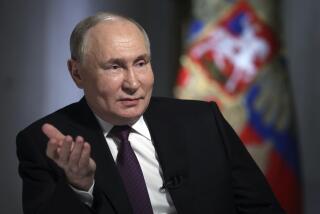Baker on Russian Nuclear Arms
With the democratization of Russia, most of us assume the threat of a nuclear war has diminished. But that may be an erroneous assumption, if we’ve failed to recognize the forces that really limit the use of nuclear weapons.
The world is fortunate that the United States, with an abundance of historically entrenched, competing institutions, was the first to develop nuclear weapons. England and France have similar checks and balances.
China may not have competing, democratic institutions, but it’s so difficult to climb the Communist Party ladder that anyone achieving ultimate power in that country would have to have forged many political alliances and be firmly grounded in the concept of mutual interest. Such a person would not likely make a “nuclear mistake.”
The same argument could have been made for the Soviet Union until the collapse of the Communist Party, the emergence of democracy and the dissolution of the union itself. But now, in Russia, the competing institutions that in other democracies would restrain the nation’s leader are too fledgling to be relied upon.
Boris Yeltsin came up through the Soviet Communist Party and probably has long since developed a respect for mutual interest, upon which nuclear restraint is based. But within the next few years, especially in a country where democracy is so new and economic times so trying, it’s not inconceivable that a man or woman whose appeal is based more in charisma than attentiveness to the doctrine of mutual interest may emerge to lead that country.
Just as Americans can be swept up in the hype, to support a candidate that a year later proves to be a disaster, so might the Russian people. The difference is, when our officials are about to do something reckless, all hell breaks loose. In time, Russian officials will know the full extent of that restraint, and the sooner the better.
JOHN BANACH
Hollywood
More to Read
Sign up for Essential California
The most important California stories and recommendations in your inbox every morning.
You may occasionally receive promotional content from the Los Angeles Times.










